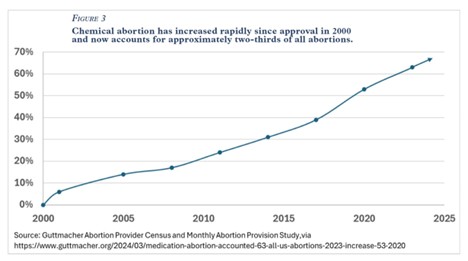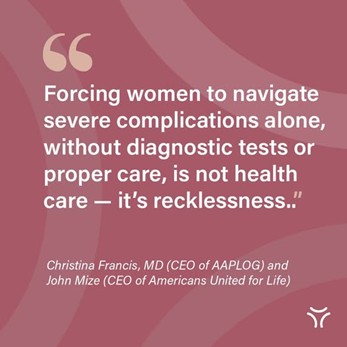Just as the Health and Human Services Secretary Robert F. Kennedy Jr. has asked FDA Commissioner Dr. Marty Makary to “review the latest data on mifepristone,” blue states are pushing to expand access.
A letter posted on social media last week by Republican Sen. Josh Hawley of Missouri, reveals Makary's review aims to closely monitor the drug's safety.
Despite new revelations of the dangers of the abortion pill, four blue states petitioned for removal of the last of the safety nets on abortion pills on Thursday. Massachusetts, California, New Jersey, and New York have submitted a petition to have the Risk Evaluation and Mitigation Strategy (REMS) program for (brand name) Mifeprex, be removed. Their request includes prescriber, pharmacy, and patient certification requirements which create new and unforeseen risks to women.
Tweet This: Despite alarming revelations of abortion pill dangers, 4 blue states petitioned for removal of the last of the safety nets on the pills.
The REMS on mifepristone, the first pill in the chemical abortion process, contains the last of the safety barriers in place to protect women from this drug that’s been shown to be four times more dangerous than surgical abortion.
The REMS is a drug safety program that the FDA used for medications only with serious safety concerns to ensure the benefits of the medication outweigh its risks. Of the 20,000+ prescription drugs approved by the FDA, just 74 medications were deemed so dangerous to warrant a REMS restriction and one of these was mifepristone. Due to its potential for harm to women, mifepristone was deemed a fit for this program.

This strategy was intended to minimize the significant risk of hemorrhage, retained fetal tissue, and infection – symptoms that can quickly become life-threatening for women. While legacy media has labeled such protections as “restrictive” – the REMS has been a last defense for the thousands of women who take this drug every year in the U.S.
[Click here to subscribe to Pregnancy Help News!]
Dr. Christina Francis, board-certified OB-GYN and CEO of the American Association of Pro-Life Obstetricians and Gynecologists (AAPLOG), speaking of the need for REMS, said, “For years the FDA has failed to provide basic protections for women and girls to lessen the serious health risks of abortion drugs.”
Francis advocates for those who might be harmed by abortion, saying, “The physicians of AAPLOG believe that women deserve better care than this. Reinstating the original safeguards, including requiring in-person medical care, is a step towards protecting women from these dangerous drugs.”
Isn’t mifepristone “safe and effective”?
The petition of these four states falsely claims the safety of the abortion pill:
“Consideration of the REMS statutory factors set forth below compels the conclusion that the Mifepristone REMS Program is no longer warranted as the medication has been safely used by more than 7.5 million women and serious adverse events have been, in the FDA’s own words, “extremely rare.”
Until recently, there was little clarity regarding the dangers of mifepristone. In 2016, the FDA nearly eliminated its reporting requirements for mifepristone - reporting only deaths. Unless women actually died, they did not make note of any complications or injuries to women caused by mifepristone for the last nine years.
With only voluntary reporting by abortion providers and many telling women not to report the abortion to emergency departments when complications arise, there has been no systematic collection of mifepristone complications. Without reports of harm, some claim the drug no longer needs a REMS.
However, a recent analysis of insurance data has provided a long overdue reality check, revealing one in ten chemical abortion patients experience serious complications during their abortions.
In the largest study of mifepristone abortions - over 800,000 cases over a six-year period – it was revealed that 11% of women who took the abortion pill experienced a serious adverse event. This included sepsis, infection, hemorrhage, or hospitalization. This is at least 22 times higher than the “less than 0.5%” figure reported in clinical trials cited on the drug’s label.
Another evaluation of adverse events submitted to the FDA with the REMS in place shows over 3,000 women suffering with complications, of which 24 of those women died, and another 500 would have died if they had not reached emergency medical care in time. And we know that up to 7% of women will need surgical intervention after a chemical abortion. With thousands of abortion pills sold each year, this creates a healthcare crisis of monumental proportions.
Abortion beyond 10 weeks is now commonplace
While most assume the abortion pill is exclusively used in early pregnancy, one of the more hidden and dark sides of abortion is those that occur in the second and third trimester. The American public is largely unaware that the abortion pill is prescribed far beyond the 10-week limit established by the FDA and the abortion industry is working to make this commonplace in so-called ‘abortion care.’
Despite increased risks to women, the journal Contraception has recently published recommendations published by pro-abortion Society of Family Planning (SFP) which encourages late abortion by chemicals.
Further in spite of the health consequences for women, the American College of Obstetricians and Gynecologists (ACOG) and the World Health Organization now promote a protocol for late-term chemical abortion.
A U.K. Government review confirmed abortion complication rates for chemical abortions at 20 weeks and over are 160 times higher than complication rates for medical abortions at 2-9 weeks gestation. These included heavy or prolonged bleeding, infection, surgery for retained placenta, heavy bleeding requiring treatment with medication, operation or blood transfusion and hysterectomy.
Mail-order abortion now the norm
The abortion industry has long sought acceptance as legitimate healthcare but continues to remove any healthcare from abortion. Since the FDA removed the requirement that the abortion pill must be dispensed in person, abortion occurs less and less in an abortion facility under the watch of an abortion provider. Rather than a medical procedure, abortion is now a quick website visit which brings abortion to any doorstep in America in a matter of hours.
AAPLOG reports that mail order abortion is substandard care:
“Women being sent abortion pills in the mail after no real medical consultation, leaving them vulnerable to serious health risks and coerced abortions.”

Women are forced, not only to start their own abortions, but also to provide their own healthcare before, during, and following their abortions. There is much risk in skipping over assessments for ectopic pregnancy, accurate determination of gestational age, testing and treatment for Rh incompatibility, fully informed consent, and assessment for coercion prior to prescribing mifepristone.
And when the worst happens, the new reality in America is that emergency departments are treating more complications than abortion facilities.
Skipping over safety steps harms women
Sadly, women commonly face abortion risks at one of the lowest points of their lives, a time they should be protected, not exposed to further harm.
Studies show that nearly 70% of women who get an abortion described their experience as inconsistent with their own values. One in four describe the abortion as coerced or unwanted.
In this hot political climate, where those who value life are mocked and challenged by media, government, tech, and big abortion, one truth remains – abortion harms both patients - babies and mothers.
Women deserve to know the truth and to be safe. They don’t give up that right when they seek an abortion.
Tweet This: Women deserve to know the truth and to be safe. They don’t give up that right when they seek an abortion.
For those who have started a chemical abortion and have regret, help is available. To learn more about reversing the effects of the abortion pill and possibly continuing a pregnancy, visit AbortionPillReversal.com.
Editor's note: Heartbeat International manages the Abortion Pill Rescue® Network (APRN) and Pregnancy Help News. Heartbeat is currently the subject of two lawsuits brough by state AGs concerning sharing information about Abortion Pill Reversal.







